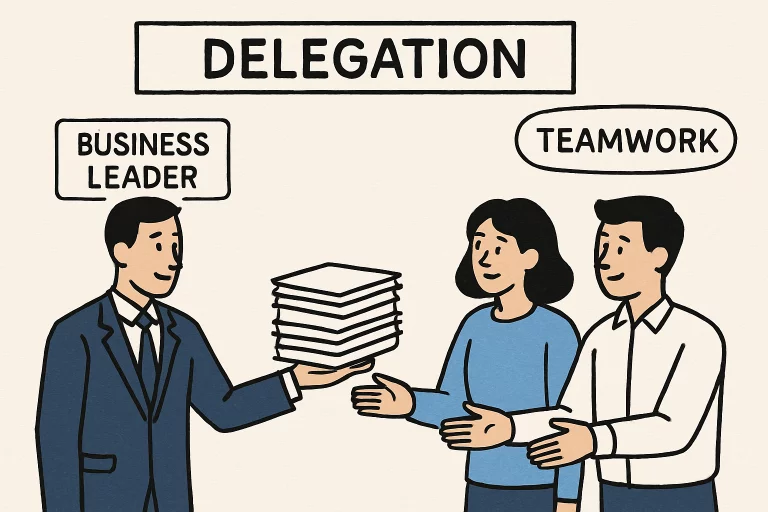Delegation is one of the most essential—and sometimes overlooked—resources any business owner or leader can leverage. The entrepreneurial drive to be deeply involved in every element of your business is understandable; it demonstrates passion, ownership, and commitment to your organization’s vision. However, attempting to exert control over every single task can inadvertently create bottlenecks, reduce operational efficiency, and ultimately stunt the potential growth of your business. Learning when to let go and confidently assign duties to others is a skill that safeguards your well-being and unlocks exponential value for your company. Adopting strategic delegation practices enables you—and those around you—to focus efforts where they have the greatest impact. For example, utilizing partnerships and systems such as Salesforce admin support allows you to offload complex technical or backend processes, giving you the freedom to nurture business development and pursue innovation. These smart solutions free up your mental bandwidth, help you refocus on higher-value initiatives, and ignite real momentum within your organization.
Mastering the art of delegation isn’t just a productivity hack—it’s at the core of sustaining a healthy work-life balance and propelling business success amid today’s competitive pressures. As your responsibilities escalate, it’s critical to keep your workload manageable. Doing so will help maintain your leadership effectiveness and ensure your operations remain agile, resilient, and positioned for lasting achievement. When you delegate efficiently, you foster a stronger team dynamic and set up a culture of shared growth, where everyone is empowered to contribute meaningfully toward your business goals.
Overwhelmed Leadership
Feeling perpetually overwhelmed is perhaps the clearest signal that delegation is overdue. When business leaders attempt to micromanage every operational detail—from daily administrative tasks to top-level decision-making—the sheer volume becomes unsustainable. This overload often blurs the line between what truly matters in your role and what others should handle. As this sense of overwhelm deepens, stress sets in, quickly paving the way to burnout and diminished productivity. Instead of propelling your business forward, you risk stagnation and poor decision-making. Handing off routine and lower-priority duties is essential for clearing mental fog and restoring your ability to focus on large-scale objectives—developing innovative products, expanding into new markets, or deepening vital relationships with clients and partners. As highlighted in Recognizing When Leaders Should Delegate More Tasks to Their Team, strategic delegation also signals trust to your team. It cultivates an environment where people feel empowered to lead and own their responsibilities. This is vital for modern leadership and creates a lasting positive impact across your business.

Decline in Work Quality
Another warning sign that delegation needs urgent attention is a noticeable drop in the quality of work. This may take shape through increased missed deadlines, recurring errors, or rushed projects that sacrifice accuracy for completion. Even leaders who pride themselves on high performance will see standards slip when stretched too thin; human attention and energy are always limited. When critical details are overlooked, the resulting mistakes can be costly, impacting customer satisfaction, brand reputation, compliance, or financial stability. Proper delegation, by contrast, disperses tasks strategically among qualified individuals, ensuring every responsibility receives the time, focus, and expertise it deserves. This approach minimizes oversights and preserves the integrity of your deliverables.
Stagnant Business Growth
When growth plateaus despite your best intentions and hard work, ask yourself where your time and energy are going. Too often, business owners and managers become ensnared in a web of daily operations that—while necessary—do not directly contribute to scaling the business or exploring new markets and revenue streams. This reactive mode leaves little energy for proactive strategizing or innovative exploration. By systematically delegating administrative, logistic, or technical tasks, you regain the capacity to network, pursue transformative partnerships, and launch fresh initiatives that drive expansion. An agile leader with a flexible, uncluttered schedule is far more capable of spotting and seizing opportunities than one bogged down by minutiae.
Underutilized Team Members
Many teams are filled with capable professionals eager for more responsibility and learning pathways. However, when leaders hold too tightly to their duties, talented individuals can become disengaged or even leave for roles that offer greater autonomy and career advancement. Delegating tasks is an investment in your people; it builds employee confidence, deepens competencies, and creates a more motivated and trusted workforce. The process of entrusting team members with important roles—or even complex projects—stimulates ownership and a sense of personal accomplishment. Over time, this approach enhances retention, strengthens your leadership bench, and lays the foundation for a collaborative, innovative workplace where diverse skills flourish. Not only does this help your business adapt and grow, but it also positions you as a leader who cultivates talent and inspires loyalty.
Decision Fatigue
Every decision—no matter how minor—carries a cognitive cost. As a leader, you’re tasked with making choices throughout every business day, from approving marketing budgets to setting schedules or resolving client concerns. The more decisions left solely on your plate, the more susceptible you become to decision fatigue, which erodes your capacity for sound judgment and drains your creativity. Delegating routine, repetitive decisions to trusted team members shields your mental resources from exhaustion so that you can devote your energy to high-impact decisions. These transformative choices materially affect the direction of your business.
Inability to Take Time Off
Ask yourself: Could your business continue to thrive if you needed to step away for a week or longer? If the answer is no, or if your absence would create chaos, then you have likely centralized too many mission-critical processes around yourself. Relying on a founder or key manager to “hold it all together” creates risk and stifles long-term scalability and business health. Effective delegation frees the business from being dependent on any single individual. Empowering your team members to take over daily roles and responsibilities ensures continuity, stability, and resilience—whether you’re busy elsewhere, on vacation, or preparing for ownership transition. Creating this operational independence also strengthens your business’s appeal to potential investors and buyers, who value robust companies and not reliant on a single point of failure.
Conclusion
Delegation is far more than simply clearing tasks off your desk—it’s a dynamic, holistic strategy that fortifies your leadership, accelerates business growth, and positions your company for resilient, lasting success. Whether you’re considering outsourcing administrative tasks through Salesforce admin support or expanding internal roles for trusted team members, the benefits touch every corner of your organization. By heeding the signs discussed above and actively embracing delegation, you reclaim your time, cultivate empowered teams, drive operational efficiency, and unlock your business’s true potential for innovation and expansion. Investing in delegation today is an investment in your personal leadership journey and your company’s sustainable future.

